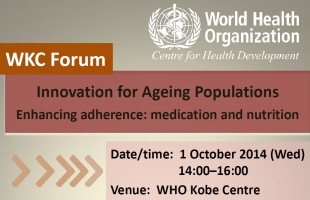WKC Forum: Innovation for Ageing Populations – Enhancing adherence: medication and nutrition

The United Nations' International Day of Older Persons is celebrated every year on 1 October. In commemoration of this year's International Day of Older Persons, the WHO Centre for Health Development (WHO Kobe Centre – WKC) will organize in Kobe an open forum on “Innovation for Ageing Populations – Enhancing Adherence to Medication and Nutrition”.
The population of older adults worldwide is growing rapidly. In most nations today, the fastest growing demographic segment is the population of adults over the age of 80. The total population of all older adults is expected to nearly triple in the next forty years from its current level, with most of the growth happening in developing nations. This demographic transition has also ushered forth an epidemiological transition. Noncommunicable diseases (NCDs) have become the leading cause of death globally, and account for 50% of all disability. Japan is particularly emblematic of this trend, having the largest proportionate population of older adults in the world, and where NCD accounts for nearly 80% of all mortality.
A patient’s therapeutic behaviours used to be judged passively based on the concept of “compliance” – how closely a patient follows the treatment prescribed by a doctor. Today, more important to supporting treatment success depends on the extent to which a person’s behaviour – taking medication, following a diet, and/or executing lifestyle changes – corresponds with agreed recommendations from a health care provider. This is the concept of “adherence”.
Many of the health challenges that manifest with ageing can be prevented and/or controlled. However, adherence to treatment becomes more challenging with age, cognitive and functional decline and with the increasing complexity of medical regimens to maintain health and quality of life. Adherence to therapies is a primary determinant of treatment success. Poor adherence attenuates optimum clinical benefits and therefore reduces the overall effectiveness of health systems.
Similarly, as people age, their nutritional requirements evolve and may be impaired by ill-health, side effects of multiple medication, changing lifestyles and lack of knowledge. Linkages between diets, medical adherence and improved health condition emerge as important elements of healthy ageing.
At this forum, four Japanese experts in the field of gerontology, medication and nutrition will present their work to enhance adherence, which can contribute to healthy ageing.
Date & venue:
1 October 2014 (Wednesday) 14:00–16:00
WHO Kobe Centre
Programme:
Language: Japanese
14:00–14:05 Opening remarks
14:05–15:20 Presentations
15:20–15:55 Discussion
15:55–16:00 Closing remarks
Speakers:
(in order of presentations)
 "Medical and nutritional adherence: Wellbeing of the elderly in Japan"
"Medical and nutritional adherence: Wellbeing of the elderly in Japan"
Dr Toshikatsu Oda
Professor Emeritus
Kobe University
 "Innovations in monitoring medical adherence in elderly patients in Japan"
"Innovations in monitoring medical adherence in elderly patients in Japan"
Dr Kiyomi Sadamoto
Professor
Department of Clinical Pharmacy
Yokohama College of Pharmacy
 "Nutrition and health maintenance in Japanese elderly"
"Nutrition and health maintenance in Japanese elderly"
Dr Hiroshi Shimokata
Professor
Graduate School of Nutritional Sciences
Nagoya University of Arts and Sciences
 "Adequate dietary intake in later life"
"Adequate dietary intake in later life"
Dr Yumi Kimura
Post-Doctoral Research Fellow of the Japan Society of the Promotion of Science
Center for Southeast Asian Studies (CSEAS)
Kyoto University

